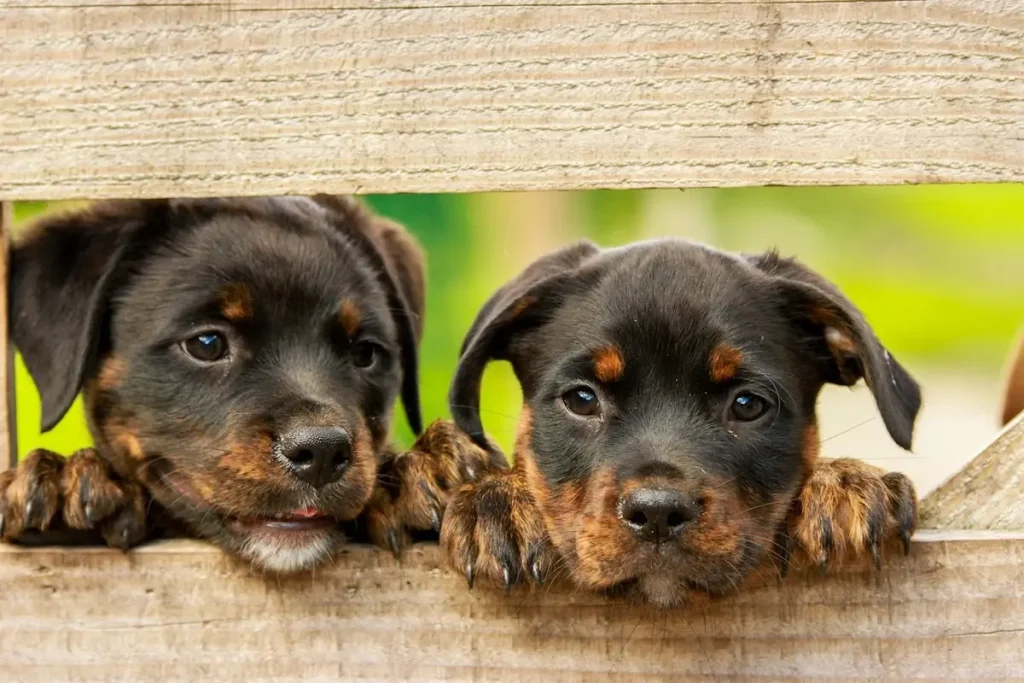Just as a seasoned chess player strategizes their next move, understanding the complex nature of a Rottweiler requires a thoughtful approach to their care and training.
You’re considering a breed that stands as the epitome of strength, intelligence, and loyalty, a steadfast companion whose history is as rich and robust as the muscular frame it carries. With their origins as cattle-protecting dogs in the Roman Empire, Rottweilers have evolved into one of the most versatile working breeds, capable of excelling in various roles from family guardian to service dog.
As you contemplate the commitment of bringing a Rottweiler into your life, consider the unique blend of firm guidance, early socialization, and consistent exercise they require to flourish. The journey with a Rottweiler at your side is not for the faint-hearted, but for those who step up, it can be immensely rewarding.
Stay with us as we unpack the layers of this noble breed’s temperament and dive into the essentials of their care—there’s much to uncover about these German guardians that may just sway your decision.
- Noise Level
- Energy
- Sociability
- Trainability
- Care
- Health
Overall
Summary
The Rottweiler is rated moderately in noise level, with above-average energy and sociability. They are highly trainable and require moderate care. Overall, they tend to enjoy good health.
Rottweiler: Traits, Temperament, and Care Guide
What defines the Rottweiler’s robust physique and character, and how should you care for this powerful breed to ensure its well-being and sociability?
Rottweiler traits include a large, muscular stature adorned with a distinctive black and tan coat, symbolizing their strength and agility. Their temperament is marked by loyalty and protective instincts, yet they possess a calm and confident demeanor.
Your Rottweiler care guide should emphasize consistent positive training and early socialization to cultivate their best qualities. This approach mitigates potential aggression and dominance. Regular exercise is paramount to maintaining their muscular build and channeling their energy positively. Routine veterinary care is essential, considering their relatively short lifespan.
Engaging in these practices will ensure your Rottweiler’s health and enhance their role as a cherished family companion.
Exploring the Characteristics of the Rottweiler
Building on the foundational care guidelines for Rottweilers, let’s examine their distinct physical and behavioral traits that potential owners should understand. As a Rottweiler Dog owner, you’ll notice their impressive stature, ranging from 80 to 120 pounds and standing 22 to 27 inches tall. Coat care is minimal, requiring only weekly brushing despite moderate shedding. These dogs are not just robust in build but also in intelligence. Proper socialization to be good canine citizens is crucial; they must be active participants in the family to ensure their well-being.
| Trait | Detail | Care Tips |
|---|---|---|
| Size | 80 to 120 pounds, 22-27 inches tall | Ensure adequate space and exercise |
| Coat | Medium-length, shiny black with rust markings | Weekly brushing, regular bathing |
| Lifespan & Socialization | Average 9 years, better socialized when active | Continuous socialization, engage in canine sports |
Rottweiler: A Comprehensive Profile and Guide
As you explore the world of Rottweilers, it’s essential to understand their robust physical attributes, which include a substantial weight range and impressive stature.
Their distinctive black and rust coat demands consistent grooming to maintain its sheen and manage shedding.
Properly socialized and trained, Rottweilers exhibit keen intelligence and vigor, yet require firm guidance to curb dominant tendencies.
Everything You Need to Know
Delving into the comprehensive profile of the Rottweiler, you’ll find a robust and intelligent breed that requires dedicated care and training to thrive as a loyal companion. Rottweilers are known for their strength and versatility, a trait honed since their origins in Rottweil, Germany.
To ensure they become well-adjusted members of your family:
- Physical Appearance and Care
- Weekly brushing and bathing
- Regular nail trimming and teeth brushing
- Personality and Training
- Extensive socialization
- Consistent guidance and jobs
- Enrollment in training classes essential
- Lifespan and Health Care
- Vigilance for potential health problems
- Importance of routine veterinary care
Embracing these aspects will fortify your bond, providing a sense of belonging for you and your Rottweiler.
Discovering the Temperament
Understanding a Rottweiler’s temperament reveals a complex interplay of loyalty, intelligence, and the need for socialization to ensure their well-being and sociability. Like many breeds, the Rottweiler thrives on consistent training, harnessing their intellect and instincts. Well-socialized Rottweilers tend to be calm and confident, able to interact amicably with people and other dogs. However, males may show dominance, needing early and ongoing training to channel their assertiveness positively.
Their active nature calls for a ‘job’—obedience training or tasks that engage them mentally and physically, preventing undesirable behaviors. Loyal and protective, Rottweilers are dedicated family members. They depend on your companionship and don’t fare well in solitude. To maintain their equable temperament, continuous extensive socialization is key, reinforcing their role as affable guardians.

Rottweiler: Is It a Good Fit for Families?
You may wonder if a Rottweiler is suitable for your family, especially if you have children. It’s crucial to evaluate their compatibility, as Rottweilers bring a mix of protective instincts and need for strong leadership and socialization.
Their muscular build and energy levels require consistent training and exercise to coexist harmoniously within a family setting.
Assessing Rottweiler’s Compatibility with Families and Kids
When considering a Rottweiler as a family pet, it’s essential to recognize their need for frequent social interaction and their instinctual role as protectors, particularly around children. Here’s what you need to know:
- Good Family Companions
- Well-socialized Rottweilers thrive in a family environment.
- They cherish being part of daily activities, enhancing their bond with the family.
- Protective Nature
- Rottweilers are often very protective of their children, necessitating supervision around kids.
- Their guardian instincts can be channeled positively with proper training.
- Socialization and Training
- Early exposure to various situations ensures Rottweilers get along with people and pets.
- Continuous family involvement in obedience training is key to their well-being.
Rottweiler Adjustability Quirks
Rottweilers require consistent and early training to ensure their well-being and adaptability due to their tendencies toward dominance and aggression, especially in males. These intelligent canines thrive on extensive socialization; without it, they may not integrate smoothly into the family unit. Being left alone for long periods isn’t ideal for Rottweilers, as isolation can lead to unwanted behaviors like nuisance barking or digging, reflecting their need for engagement and purpose.
Your Rottweiler’s training regimen should begin in puppyhood, establishing you as their respected leader. This approach mitigates extra liability from potential aggressive incidents. Remember, their serious-minded nature pairs with loyalty, demanding a responsible, dedicated owner.
With your commitment to their physical and mental needs, your Rottweiler will flourish as a well-adjusted family guardian.
Rottweiler Obedience Essentials
As you train your Rottweiler, consistent, positive reinforcement techniques are crucial for successful obedience.
Early socialization and structured obedience training set the foundation for your Rottweiler’s exemplary behavior and social skills.
Integrating regular, stimulating exercise into their routine maintains their physical health and sharpens their mental acuity.
Effective Training Strategies
Employing consistent, positive training methods from an early age is crucial for shaping a well-behaved and obedient Rottweiler. Committing to early socialization and obedience training ensures your Rottweiler becomes a pleasant, well-mannered companion. Remember that Rottweilers thrive on regular exercise, which is not only essential for their physical health but also for their mental sharpness.
Here’s a quick guide to reinforce effective dog training strategies:
| Aspect | Description | Tips |
|---|---|---|
| Consistency | Regular training sessions | Set a schedule and stick to it |
| Positive Reinforcement | Rewards for good behavior | Use treats, praise, or play |
| Socialization | Exposure to various environments | Introduce new experiences slowly |
| Exercise | Physical activity to aid training | Daily walks or playtime |
Exercise and Grooming Needs

Maintaining the health and vigor of Rottweilers necessitates regular exercise regimen, including activities that cater to their strength and endurance. Daily exercise is crucial, not only for their physical form but also for their sharp intellect. Engage your Rottweiler in long walks, spirited runs, and sports like agility or cart pulling, which are ideal for their robust build and energy levels.
While their grooming needs are minimal, they are essential for their well-being. The Rottweiler’s double coat benefits from weekly brushing to remove loose fur and ensure a sleek appearance. Regular bathing will keep their coat clean, but it’s important not to overdo it to preserve the natural oils. Pay special attention to cleaning the folds around their face to prevent irritation and ensure overall health.
Health Considerations
As a Rottweiler owner, you must be vigilant about common health issues affecting your dog’s quality of life and lifespan.
Hip dysplasia and osteosarcoma are significant concerns for this breed, necessitating early screening and intervention.
You’re responsible for ensuring they receive regular veterinary care to effectively detect and manage these conditions.
Common Health Issues and Lifespan
While the robust Rottweiler typically enjoys a lifespan of about 9 years, their health and longevity are subject to a range of genetic and care-related factors. Female Rotties tend to outlive their male counterparts by roughly 10 months, averaging 9.5 years. Despite this, both sexes may encounter specific health challenges.
Notably, hip and elbow dysplasia are common within the breed, conditions that can affect mobility and quality of life. Bone cancer also poses a significant threat, impacting the breed more frequently than many others. Proactive health care and mindful breeding practices can help mitigate these risks.
Your commitment to their well-being can influence their life span, ensuring these loyal guardians enjoy as many healthy years as possible by your side.
Is Rottweiler the Right Dog for You?
Determining whether a Rottweiler aligns with your lifestyle and preferences is crucial before considering this powerful and devoted breed as your new companion. Well-socialized Rottweilers can be affectionate family pets, forming strong bonds with their owners. Their physical and mental well-being hinges on consistent, positive training methods and early socialization, essential to fostering good behavior and manners. As large, muscular dogs, Rottweilers thrive on extensive exercise and mental stimulation.
Be prepared for potential health issues such as hip dysplasia and osteosarcoma. If you feel connected to these loyal guardians, consider adopting from a rescue or selecting a reputable breeder who ensures they’re properly trained and socialized.
Alternatives for Rottweiler: Protective and Confident Large Breeds
Explore these breeds if you appreciate the Rottweiler’s protective nature and confidence, perfect for those who value strong and assertive large dogs.
| Similar Dogs | Short Description |
|---|---|
| Doberman Pinscher | A breed known for its loyalty and protective instincts, strong and intelligent. |
| Bullmastiff | A powerful and protective breed, known for its gentle and loyal nature. |
| German Shepherd | A highly intelligent and versatile breed, known for its protection and working abilities. |
| Boxer | Energetic and playful, great with families and known for its protective nature. |
| Mastiff | Known for its large size and gentle nature, great for protection and family life. |
Conclusion
In conclusion, while you might worry about a Rottweiler’s imposing presence, rest assured their loyalty and affection make them ideal family protectors when properly trained. Commit to their care, from regular exercise to early socialization, and you’ll find a devoted companion.
Remember, a Rottweiler thrives on attention and structure. By meeting their needs, you ensure a healthy, harmonious bond. Consider all factors to decide if this robust guardian aligns with your lifestyle.
